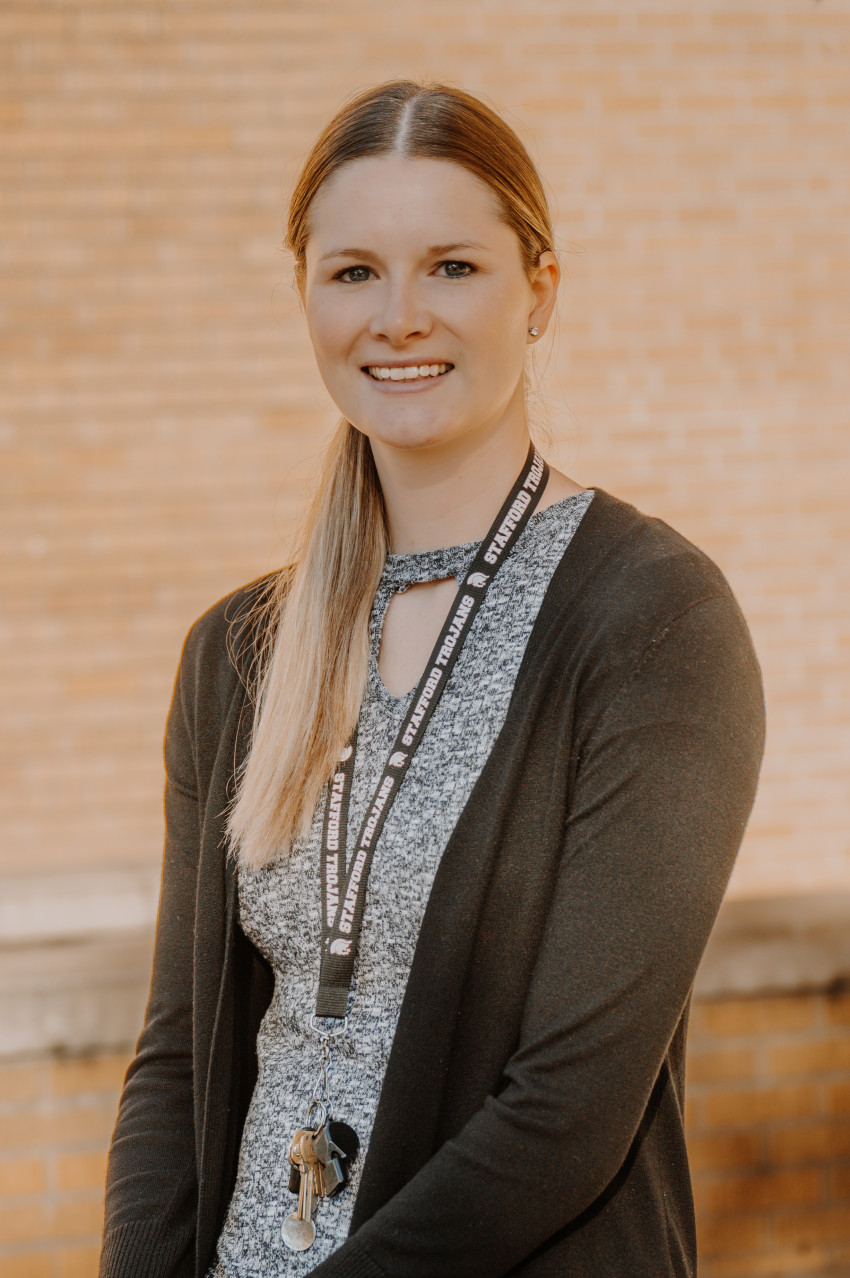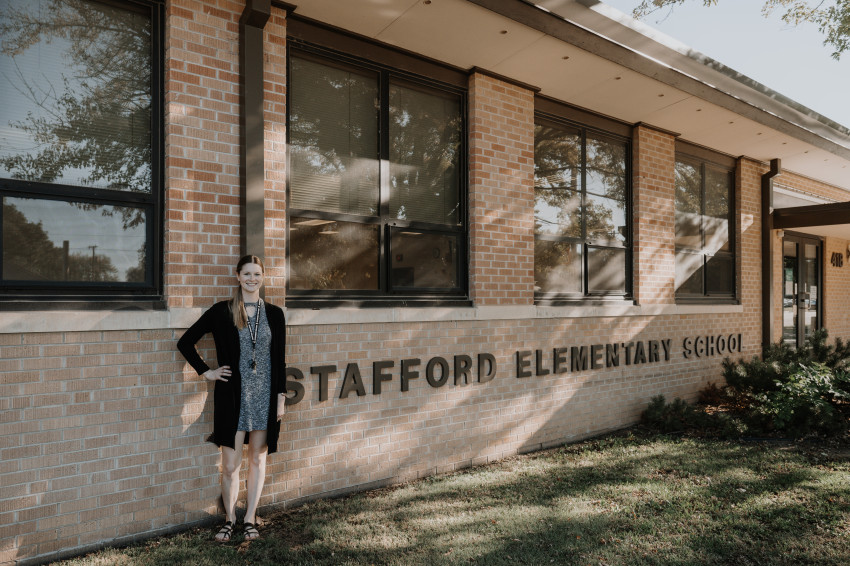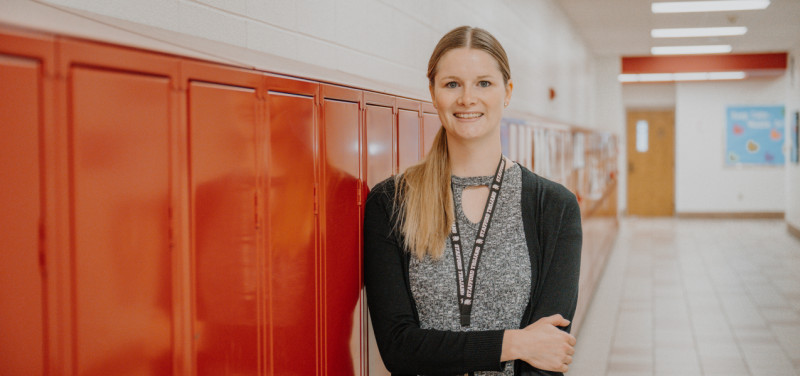By Sheridan Wimmer on December 5, 2024
Rural School Social Worker Receives Award for Mental Health Advocacy
Destiny Johnson of Stafford County worked to provide mental health services to students in rural Kansas school
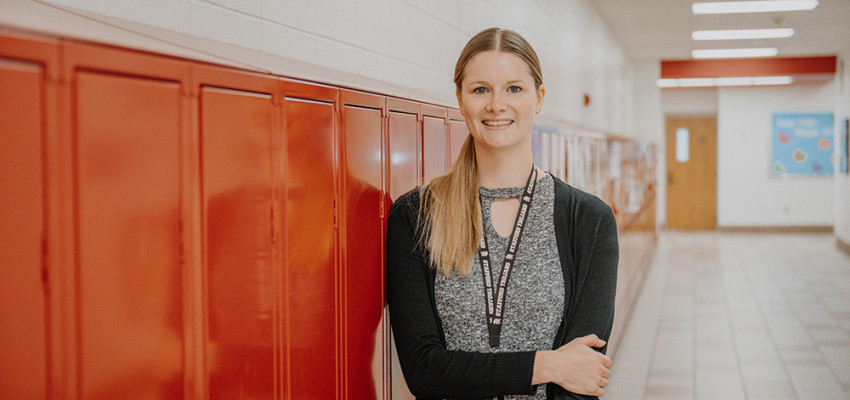
Hanging above her nameplate by her door at Stafford Elementary School was a sign that read, “If you think my hands are full, you should see my heart.”
The phrase is perfect for someone like Destiny Johnson who served as the pre-kindergarten through 12th grade social worker for Stafford USD 349, a 1A school in a town with a population of fewer than 1,000.
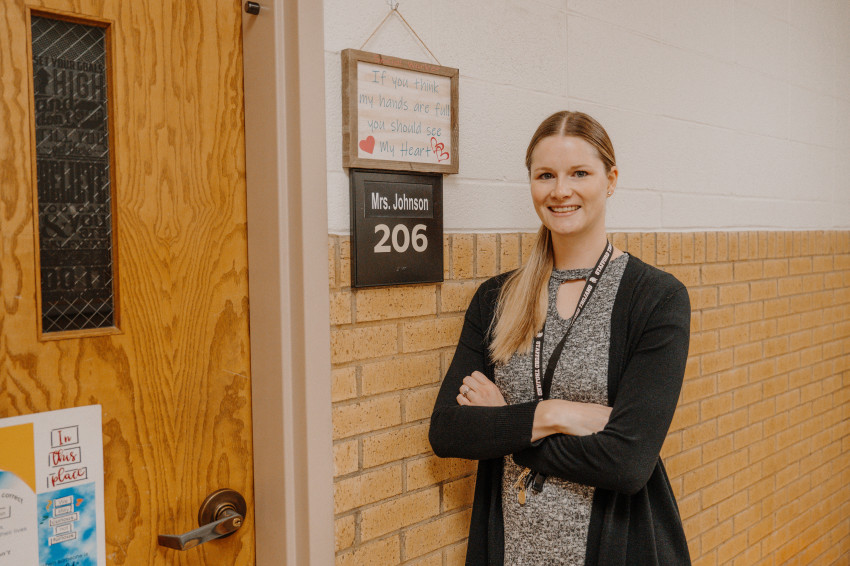 Her hands were full serving the school with social work needs, but her heart was full knowing she’d provided essential emotional support for students in the rural town.
Her hands were full serving the school with social work needs, but her heart was full knowing she’d provided essential emotional support for students in the rural town.
“It’s really important for the kids I worked with to know they aren’t alone,” Johnson says. “We would try to start services at a young age so they can learn tactics early. Early intervention when I see kids struggling either emotionally or behaviorally is key for them to succeed later in life.”
As with mental health struggles in rural areas, so too are issues with adequate daycare. Johnson, who has two small boys, came face-to-face with the reality when her daycare options reduced to zero. At the end of the fall 2024 semester, Johnson reluctantly had to resign her position at Stafford to care for her family.
“It’s bittersweet, but this is the right thing for my family,” she says.
Still, her work to provide essential emotional support to students in Stafford is commended.
PERSONAL STORY OF RESILIENCY
Born and raised in Stafford, Destiny and her husband, Ethan, were high school sweethearts. After a break while she attended the University of Kansas to earn her undergraduate degree in psychology, the two reconnected during her graduate studies in Kansas City and got married. Then they adopted Destiny’s brother. Returning to Stafford was the goal so Ethan could work on his family farm. It worked perfectly when the social worker position opened at the Stafford school district.
“Unfortunately, my family has a long history with mental health struggles,” Johnson shares. “I’ve been aware of mental health struggles for most of my life and I guess that’s what led me into my life path, not just with my career, but with my family, too.”
Johnson didn’t share her personal experiences with mental health with her students much, but if they ask her, she confidently told them she understood.
“I didn’t talk about myself much with them unless they wanted me to,” Johnson says. “But sometimes I would kind of put that tidbit in there and say, you know you're not alone in this. I grew up being around these mental health and family struggles. It lets them know they're not alone.”
PROGRAMS BOOST MENTAL HEALTH SUPPORT
Johnson’s work was guided through several programs. First, the Kansas Department of Education’s Mental Health Intervention Team (MHIT) Program, a 2018 legislative action with grant dollars that allowed nine school districts to enter into agreements with local community mental health centers. What started as a one-year initiative saw so much success that it has continued through 2024. The first year of the program saw 1,700 students participate and show overall improvement in academic performance, attendance and behavior. The number of school districts participating in the program has grown over the years.
“The first year I was hired, we got the grant that allowed us to form a partnership with the Center for Counseling and Consultation in Great Bend, so that enabled us to bring some of their services into the school,” Johnson says. “This helped parents or guardians not have to go out of their way to travel for their kids’ support. I facilitated the connection between the students and the expert help they needed, whether it’s making referrals, facilitating Zoom appointments, coordinating schedules communicating with parents, organizing school staff, writing reports and anything else required of me as a liaison.”
 Another program Johnson utilized in her work is through Wichita State University called the School Psychology Partnerships to Increase Rural School-based Services (SPIRSS) Program. This program is funded through the Mental Health Service Professional grant by the Department of Education. The goal of SPIRSS is to increase the number of school psychologists from diverse backgrounds in Kansas high need/rural districts. Johnson again served as one of the primary school contacts for this program making referrals, analyzing and sharing data, updating essential documentation, providing feedback and technical assistance, communicating with involved parties and more.
Another program Johnson utilized in her work is through Wichita State University called the School Psychology Partnerships to Increase Rural School-based Services (SPIRSS) Program. This program is funded through the Mental Health Service Professional grant by the Department of Education. The goal of SPIRSS is to increase the number of school psychologists from diverse backgrounds in Kansas high need/rural districts. Johnson again served as one of the primary school contacts for this program making referrals, analyzing and sharing data, updating essential documentation, providing feedback and technical assistance, communicating with involved parties and more.
Through these programs, Johnson saw significant improvements in the young people she worked with. Throughout the past five years of the MHIT program, 110 students have been referred, 82 of whom got involved with the program and started services. Of those who struggled with attendance, approximately 67 percent showed improvement; 80 percent showed improvement in externalizing behavior (scream/yell in class, throw things, destroy property); 75 percent showed improvement in academic performance; and 81 percent showed improvement in internalizing behavior (sad/tearful, lack of social connections, low self-esteem).
“We had a student who started the Mental Health Intervention Team Program due to both internalizing and externalizing behavior,” Johnson says. “Over the years, he’s had fewer and fewer incidents in the classroom and has even been able to demonstrate improvements in academics. At one point, when we were talking about a frustration the student encountered and I asked him how he could handle it, he named some of the strategies that were taught to him and even identified where he learned them. This is something a lot of kids struggle to do, especially in the face of frustration. It’s been a pleasure to watch this student make progress in both social-emotional and academic skills, and also be able to come out of his shell and let his personality and talents shine.”
ZERO REASONS WHY
Not only did Johnson facilitate expert-led discussions and meetings to support the needs of her students, but she also utilized a program called #ZeroReasonsWhy (ZRY) to build students as leaders in mental health advocacy.
The ZRW program is a teen-led storytelling and community mobilization campaign that aims to reduce stigma of mental health help and prevent teen suicide.
 “We had a small group of students who met once a month and we talked about practical ways we can help remove stigma of mental health and build community support,” Johnson says. “These students are positive leaders who their peers look up to. Some of the students in ZRW do struggle with their own mental health or they have family or friends who struggle. That’s how they get involved. They see the need, they see the struggle and they want to help. They want to be part of the change.”
“We had a small group of students who met once a month and we talked about practical ways we can help remove stigma of mental health and build community support,” Johnson says. “These students are positive leaders who their peers look up to. Some of the students in ZRW do struggle with their own mental health or they have family or friends who struggle. That’s how they get involved. They see the need, they see the struggle and they want to help. They want to be part of the change.”
The group’s main activity involves students sharing their experiences. Over the years, this group has been involved in several activities to raise awareness of the prevalence of mental health issues and suicide and encourage youth to seek help. Some of these activities include hanging posters around the school, putting yard and window signs around the community, sharing information and resources via social media, bulletin boards and information booths. ZRW groups also host “yellow out” events, which are events where people wear yellow clothing or accessories to raise awareness about mental health, particularly teen suicide prevention.
RURAL NEED
The existence of programs like the ones Johnson championed indicates the need for mental health services in rural areas in Kansas. In 2023, Kansas ranked last in the nation for mental health care due to high prevalence of mental health reports and low access to care.
Although other states have the same barriers to access as Kansas – including financial and geographical – the stigma of receiving help is part of the issue.
“One of my biggest hopes and dreams in my line of work was to remove the stigma associated with getting help,” Johnson says. “Even though we have all these wonderful programs, there are still students who don’t want their peers to know they’ve been in therapy or that they’ve struggled before. I want people to know it’s OK to struggle, but it’s not OK to stay that way.”
“Rural areas are already one of the most underserved populations when it comes to mental health but within the rural community, she also served one of the most vulnerable populations: children,” says Sharilyn McNickle, the Stafford County Farm Bureau Coordinator who has seen Johnson’s impact in the Stafford community. “Oftentimes, children are not given a voice or choice, and Johnson would aim every day to help give those back to them. She met with students and got them connected with other positive adult supports. The students she worked with were given an outlet to express their struggles, needs, wants, goals and more. They were also given opportunities to share their experience and what they need to determine behavioral interventions and educational supports.”
KANSAS FARM BUREAU HONORS MENTAL HEALTH ADVOCACY
Kansas Farm Bureau understands the unique needs of rural Kansans. Through the years, the organization has stepped up its efforts to share resources, reduce stigma and improve access to mental health care. What started as a webpage at www.kfb.org/ruralmindsmatter has evolved into grassroots efforts initiated by farmer and rancher members to advocate for rural mental health.
In 2024, members saw an opportunity to feature inspiring individuals making incredible impacts in their communities in mental health advocacy. Kansas was ranked last in mental health in 2023, so the needle needed to move. The Rural Minds Matter Young Advocate of the Year Award aims to celebrate the work that cultivates resilience and well-being among farmers, ranchers and rural communities.
A cohort of judges voted to award Johnson with the inaugural award.
“Destiny didn’t do the bare minimum; she would go above and beyond to help meet the needs of our community,” McNickle says.
Johnson’s hands are full, but her heart is even fuller. The dedication, commitment and love she has for her students is apparent and commendable.
The situation Johnson is in now – where she has to face leaving the students she’s dedicated so much to – isn’t out of the ordinary for rural communities. When one integral part of a community isn’t available, another suffers. But Johnson will find ways to continue to support the mental health needs of her rural town because her heart is that big.
For more information about Kansas Farm Bureau’s Rural Minds Matter Advocate of the Year program, visit www.kfb.org/ruralmindsmatter. Applications and nominations for the 2025 award will open in May 2025 to honor Mental Health Month.
YOU MAY ALSO ENJOY:


